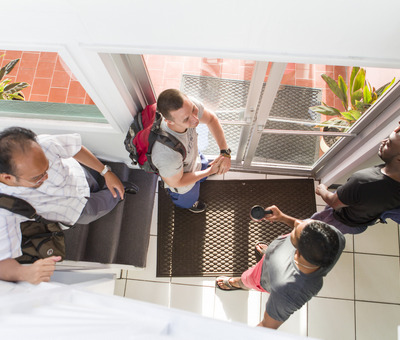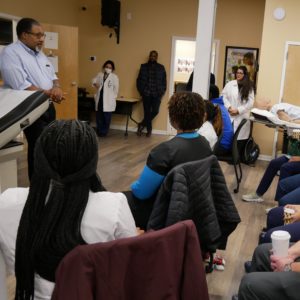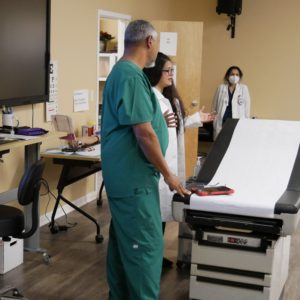From the desk of the CEO, Milo Pinckney
Starting Off Right
While attending medical school, one of the most important issues to address will be your financial plan. Financial support through non-traditional financial aid structures will at times seem daunting and almost alien relative to your student loan experiences as an undergraduate. Don’t worry just yet, all is not lost. There are resources available to meet your financial aid needs. AUIS office staff are available to assist you when you have questions or concerns.
The amount you borrow in medical school will likely be a larger amount than that borrowed as an undergraduate or as a graduate student; however, don’t let loan needs intimidate you. Be mindful of the amount of money you borrow to cover your education expenses so that repayment will not be an overwhelming or unprepared for surprise.
Remember, you don’t have to borrow the entire amount needed. You have financial options available. Consider borrowing only what you really need as needed.
- Staggering your borrowing will diminish your aggregate financial obligation post-graduation.
- Learn about and consider asset leveraging to supplement your education cost.
- Investigate debt consolidation strategies that may be available to you.
If you have borrowed more than necessary, check with your financial provider to see if you can return a portion of your loan. Remember, once a loan is disbursed, interest starts accruing on the loan, so you will pay back more than just the amount you borrowed. Keep in mind, the less you borrow during medical school, the less you will have to pay back when you graduate from medical school.
Money Management is a Discipline
Medical school lifestyle expenses are very different from undergraduate education. You will be incurring a broader spectrum of financial exposures during your medical education. How you budget and plan will have a significant impact upon you aggregated debt and education cost experienced. Let’s be very frank here. You are going to need to make some significant lifestyle adjustments over the next 7-9 years of your life….
Understand that while money has a finite value, time has a variable value that escalates with its misuse. Managing your money effectively will render very predicable economic outcomes. However, managing time ineffectively will have surprising impact upon the expenses realized.
Here are some simple money and time saving suggestions that are known to make a significant difference in your economic experience at AUIS:
- Join a cooking co-op or cook several portions at once to freeze for a later date. A cooking co-op is not only a more social way to spend your meal, but it saves time cooking. You may even get a few new recipes or meal ideas.
- Make your own coffee or tea and buy a thermos. You’ve probably heard this before; endless cups of coffee from a coffee shop can really increase expenses. If you really must pay for coffee, consider opting for a smaller size or limiting yourself to plain drip-coffee instead of fancier drinks. Your wallet and your waistline will thank you.
- Never buy bottled water. Not only are all those bottles terrible for the environment, but they’re also expensive.
- Bag your lunch. Your time at AUIS will limit your available freetime and having irregular hours will be less stressful and costly if you have easy, healthy, homemade food with you. Not only will you save time and money, but you may also eat better.
- Shop smart. If you buy your groceries online, you may save time but you will incur delivery cost. So go to the store. When doing so, always bring a list to minimize impulse buying and browsing time. Join your market’s “shopper’s club” if one exist so as to take advantage of weekly specials. Design your menu based on weekly sales while taking advantage of manufacturer’s coupons (available online as well as in the paper). Whenever possible, buy generic brands.
- Take control of your credit cards. Try not to carry a balance on your cards; this will save you incurred interest expense. Additionally, only carry and use credit cards that don’t charge an annual fee.
- Avoid assessed late fees. Pay your bills on time and whenever possible online. Late fees add up and almost assuredly will negatively affect your credit rating. If you do miss a payment, call the creditor and ask to have the late fee waived.
- Avoid ATM fees. While abroad bank locally and use your bank’s ATM for cash withdrawals. International ATM fees apply prohibitively expensive service fees.
- Buy used books. There are numerous websites where you can buy, sell, or even swap books. If you and your friends need the same books or several titles, try buying your purchases together to save on shipping or even qualify for free shipping. Many text are available digitally, whenever possible source them electronically. AUIS has made substantial investments in learning technology, digital text will enable you to maximize your use of our tech resources.
- Bike to school/work. If conditions are favorable, schedule, and location are suitable, bike to school/work. It helps you keep in shape and it is less costly. To save even more money, buy a used bike. A regular cardio regimen will enhance you academic performance. Walk, ride and exercise regularly, but with responsible focus on moderation. The island is hot.
- Take public transportation. AUIS has developed a strong transportation system for the benefit of our students. Additionally, the island offers affordable public transportation. We strongly advise against our student’s purchase of cars while on island. it will be more cost effective to rely upon the transportation resources available than to have a private car. It might actually be less stressful too!
- Join a carpool. If you do drive—form or join a carpool. This will help you save money on gas, parking, “wear and tear” on your vehicle, and also allow you to share the driving responsibilities with others. If you share your vehicle with other drivers be sure to ensure that they are listed on your local insurance. Insurance coverage restrictions differ substantially on island from those in the states.
- Buy big items from online classifieds. Try websites like “International Craigslist” for second hand or reduced prices, or “Freecycle” to find deals on free items. However, be aware that international shipping cost can in many cases nullify the economic savings anticipated. Whenever possible have goods delivered stateside and carried by guest or when traveling to and from the island.
- Develop an economic diet The Island offers a great sampling of tropical fruits, be adventurous and explore them all. Your health and your wallet are impacted by your diet.
- Share housing costs with a roommate. We know that many graduate level students prefer to live alone. Balance the desire to live alone with the economic benefit of making the compromise. The dollars saved will carry other expenses a considerable distance.
- Buy clothes at end-of-season sales. AUIS has a school dress code that encourages the donning of Scrubs. Take advantage of it. You are in medical school not fashion and design school. The money saved will buy some valuable books
- Buy generic brands rather than name brands products. An advantage to being on island is that while on island you have access to brands from around the world. Pay attention to package sizes, values per weight and other similar factors that will influence the effectiveness of your purchase.
- Buy non-perishable items in bulk
- Cut down on frequent dining out – pack your meals and make coffee at home. I know we said this before, listen to the message.
Additional Savings Information
- Take a savings quiz at MyMoney.gov.
There is no bad source to learn money saving tips from. Invest the time to find as many sources as you can and be generous and share them with students that follow you.
Learn the “The 30 Minute Rule”: If you see something you “have to have” wait 30 minutes, then if you still can’t live without it—make the purchase responsibly. Nobody “needs” the latest IPhone, Droid, Starbucks, KFC, Domino’s, McDonalds and alike. The moment of pause will help you to realize that as well.
Think About It…
Decide what makes sense for you. If you live more responsibly now and make smart choices about how you use and spend your money now, chances are, you’ll be paying a lot less when you enter repayment phase of your career.
Small personal choice and behavior changes will make a big difference in your economic realities over time.
Know your credit standing
It has been said that the greatest expense in your life will be housing. That may have been true in your grandparent’s lives, but it’s not likely to hold true in yours. The truth is, Taxes, education and credit will likely be the greatest cost in your life. Knowing your credit standing will play a critical role in your life and medical education and clinical practice career.
- Know what’s on your credit report
- Individually report any discrepancies, errors and information inaccuracies found, to all three reporting agencies. Do not use third party reporting services ever.
- Regardless of anticipated needs, protect and actively work on improving your credit score.
Debt, If Possible Start at Zero
To the best of your ability, prior to beginning medical school liquidate as much pre-existing credit card related and/or undergraduate loan debt that you already have. Admittedly this is difficult If not impossible for most, but when and if able it will ensure a much better start of your medical education! The less debt you have when you start medical school, the less you will have to repay when you enter residency or practice.
- Learn about financing options
- Talk to your admissions advisor and or financial advisor to learn about loans, interest rates, and repayment options before borrowing.
- Know your alternatives to borrowing — such as scholarships and/or perhaps support from family members
- Be creative and investigate if loved ones are willing to invest in your future through a creative personal investment vehicle
- Get organized and know what loans you already have and what options are available to you in managing them. DON’T ASSUME YOU KNOW, ASK !
Investigate deferment and forgiveness programs.
These programs can have a positive impact upon your future financial obligations. Some examples of such programs are:
Commissioned Corps – Available to veterans of the services
The United States Public Health Service Commissioned Corps (USPHSCC) is the federal uniformed service of the United States Public Health Service (PHS) consisting of only commissioned officers as one of the seven uniformed services of the United States. The PHS Commissioned Corps fill public health leadership and service roles within federal government agencies and programs. Additionally, the U.S. Department of Veterans Affairs highlights various programs on their website. Some of these programs include the Education Debt Reduction Program (EDRP) and the Health Professional Scholarship Program (HPSP). Visit the U.S. Department of Veterans Affairs website to learn about all VA education support opportunities
Civil Service Programs
Opportunities exist to serve through the Indian Health Service (IHS), the Centers For Disease Control, the National Institutes of Health, the National Health Service Corps, the U.S. Department of Health and Human Services (HRSA), as well as other federal agencies. As a civil servant (public sector employee working for a government department or agency) you may meet the qualifying criteria for a scholarship, loan repayment, or loan forgiveness program to assist you with your medical education loans.
Loan Forgiveness Options
- See the Public Service Loan Forgiveness fact sheet for additional information on loan forgiveness options.
- Utilize the AAMC’s free, searchable database of state and federal loan repayment and forgiveness programs at www.aamc.org/stloan.
- The income-driven repayment plans may also provide loan forgiveness. Review this chart to compare the repayment plans.
Budgeting
Although the word “budget” often has negative connotations, it also offers many benefits. For example, you will find that a realistic budget will help you.
- Maintain better control of your spending and be less likely to run into credit problems.
- Cover your essential expenses before making optional purchases.
- Prepare for an unexpected expense by building an emergency fund.
Budget planning is the foundation of personal economic health. Know, understand and respect your personal economic limitations. No matter what you owe, need, want or believe you can’t live without SAVE 7-10% of every dollar that passes through your life. This simple rule will position you for future economic health forever.
- Develop a serviceable plan
- Be fiscally proactive and time reactive to changes in your financial circumstances.
- Keep your personal emotions and social influences out of your financial decisions. If you’re friends and neighbors aren’t paying your bills don’t consider their feeling about what you’re not spending. Your financial health is just that, yours’s. The decisions you make will be paid for and lived with by you alone.
- Leave your pride in the bathroom mirror, seek financial help, assistance, guidance and support from any and all willing to share with you. You will have the opportunity to repay their kindness when you are well educated clinical professional.
- Be mindful of the fact that a successful medical education will not be achieved by you alone. There will be many players in the mix that will play a critical role in your attainment of your chosen goal. You can be a great doctor one day, but it starts with being a grounded and centered person today. Don’t let the economic burdens, fears and associated emotions deter you from achieving your objective. Work hard, be diligent help other and accept help when it’s available to you. SUCCEED…….
How to Set Up a Budget
The first step to budgeting requires that you know what your income (for a student, this is likely money from student loans) and expenses are each month. You will need to add up your income, determine your expenses, and calculate the difference to see if you have a surplus or deficit before you can actually create a budget. Some people have a hard time accurately determining what their expenses are each month, so they may need to take a month to track their expenses before actually formulating their working budget.
It may help to categorize your expenses as either “fixed” (stay the same every month) or “variable” (fluctuate from month to month).
After you total your monthly expenses, and subtract that from your income, you will then know what your “bottom line” is. If you find that you don’t have enough money to cover your expenses, consider making adjustments to your variable expenses; this may be an area in which you can make up for some of your shortfalls. Use the budgeting worksheet below to help you create your budget.
Examples of fixed expenses:
- Rent
- Auto loan payment
- Health insurance premium
Examples of variable expenses:
- Groceries
- Clothing
- Dining out
The below form will help with your budgeting plan.



